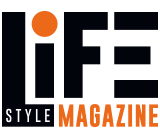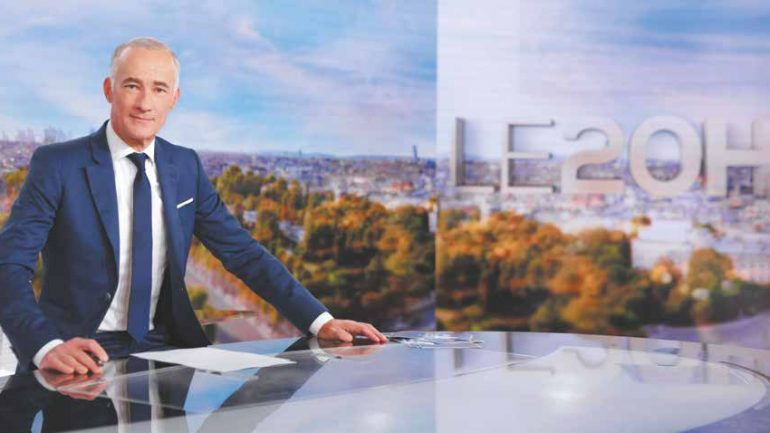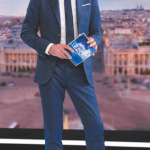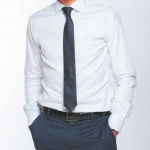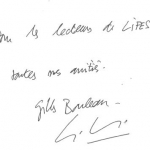What motivated you to pursue a career in journalism, and how did you end up hosting the 8 p.m. news on TF1?
As far back as I can remember, I’ve always wanted to be a journalist, to travel, to discover, to meet people I didn’t know, in languages that were unfamiliar to me, in countries that I sometimes struggled to place on a world map.
I first embraced journalism by working in the field for 25 years before becoming a foreign correspondent for TF1 in Great Britain and the United States for a decade. My transition to presenting the 8 p.m. news happened unexpectedly. After gaining experience presenting news on LCI in the 1990s, I chose to focus on reporting for twelve years before being called back by TF1’s management to participate in a casting in 2011. Although presenting the 8 p.m. news was not my primary goal, I discovered genuine pleasure in this endeavor.
Can you describe a typical day in the life of a 8 p.m. news TV host on TF1?
There is a somewhat selfish aspect in the profession of a journalist and reporter. In a journalistic career, one desires to experience only exceptional moments, which is why we do not want a structured life, a desk job, a predictable life.
In my journalistic career, a memorable moment was my mission in the Amazon to meet Raoni, an Indian chief fighting for the preservation of the planet. Departing with Sting, the former lead singer of The Police, we spent exciting weeks trying to be accepted by his people in their village. This experience shaped my conviction about the importance of protecting the planet, a message that remains relevant today.
How do you manage the pressure and personal emotions when you have to announce tragic or difficult events live to a significant audience?
I have long believed that to do this job well, which sometimes leads our viewers to painful, murderous territory that does not reveal the most flamboyant side of the human soul, a bit of detachment is necessary. When I discuss this with my doctor friends, they all say, «You know, to be a very good doctor, you need empathy for your patients, and a little bit, even if the term is difficult to use, of detachment, otherwise you won’t make it.» When you have weeks of anxiety-inducing news, violent protests, a pandemic, wars in Europe, the Middle East, or elsewhere, you must not shield yourself, but you must try to maintain a bit of composure. And in the same TV news broadcast, we must also offer our viewers antidotes and reasons to hope, the positive aspects of life.
What are the essential skills that every journalist must possess to succeed in the field?
To succeed as a journalist, intellectual honesty remains a cardinal quality. This entails never saying something that one knows to be false and always sticking close to factual truth. In addition to this, curiosity is crucial. It is essential to keep an open mind and take an interest in various fields, even outside one’s specialty.
As a journalist, what are your aspirations or the topics that are closest to your heart in terms of information?
Complex question, very simple answer: everything interests me. Because behind every question, every fact, there is humanity, there is history, there are question marks, and I like to wake up in the morning thinking, «Great, tonight, I will have learned something in any field whatsoever.» That’s why I like to delve into newspapers from the first to the last page, including subjects in which I have the least expertise. I enjoy being surprised. Just as other journalists do their job well, they also get me interested in Mayan architecture, Laotian gastronomy, Norwegian football, which are not initially my areas of expertise. They make the effort to approach me, just as I try in my reports and in my news broadcasts today to reach out to viewers by deciphering the news.
Can you describe a typical day in the life of a 8 p.m news presenter on TF1?
The 8 p.m. news is like a train that departs at 7:57 p.m. with hundreds of people on board, in control rooms, on the set, and 3000 kilometers away in Paris for our correspondents, and everyone has to be ready to get on board. As for me, my day starts early in the morning with listening to the radio and reading the press, carefully noting relevant information in a notebook. Meetings with the 8 p.m. team and editorial conferences punctuate the morning. The afternoon is dedicated to writing the news, ensuring a coherent narrative thread despite the diversity of topics. Teamwork and interaction with the reporters help build the news, which often undergoes significant changes until its broadcast at 8:40 p.m.
How do you view the evolution of journalism in the digital age, and how does it affect your work?
This is a very important question: in the digital age where everyone has a cellphone, a tablet, and receives notifications, news is often reduced to stimuli, short pieces of information (a victory, a death, an announcement…). There is rarely any context, analysis, to accompany this information. And information without explanation, without nuance, isn’t really information, and in my opinion, it’s quite dangerous. To all the people who no longer watch TV news, who don’t listen to the radio, who don’t read newspapers, and who feel they don’t need it, I would like to say that a simple notification is not enough to understand what is happening in Ukraine, or why two people received the Nobel Prize in Medicine. In the digital age, journalism has evolved significantly. We must not abandon in-depth explanation, we must continue to decipher, to qualify, to put into perspective, all while riding, not succumbing to, the beast that is speed because in the era of social media, everything moves extremely fast. So, it’s a coexistence that is not always easy, but it more than ever justifies our role.
What advice would you give to young journalists who wish to follow in your footsteps?
My path, that of journalism, involves a lot of work, many encounters, and extensive reading. You must enjoy being surprised, surprised by the world around you, love discovery, and have the mind of a schoolchild or an eternal student, meaning you want to return to school every day and feel that you’ve learned a lot by the evening. That’s the beauty of this profession. I would tell the young ones: learn, read, meet people, listen, be curious, open your mind to the maximum, and you will undoubtedly do good journalism.
In the end, what is the role of the journalist in modern society, and what impact do you hope to have through your work on TF1?
I want to answer this question with an assertion: In a democratic society, journalism plays a vital role in maintaining a compass that points to factual truth. Journalists reaffirm indisputable truths, providing markers in a world of ultra-rapid and continuous information flows. It is essential to present the facts as they are, without distortion or alteration, thereby ensuring clear direction for the public.
It is therefore crucial that there are journalists to speak what is.
What would you like to wish readers of LiFE Magazine?
I believe it was the American design genius Raymond Loewy who, when asked what he did, said, «I do design, industrial design, things that can be seen as light or superfluous, but I believe that what is useful must be beautiful, that what surrounds us must be beautiful, must have a form of elegance.» I think that for the readers of your magazine, having a form of elegance and recognizing elegance, in behavior, in all areas of life, seems quite important to me because elegance is akin to a form of humanity. Elegance when you lose a match, elegance in an oral joust… That’s it, the cult of a form of elegance is good, and it has nothing to do with the worship of luxury, these are two different things.
